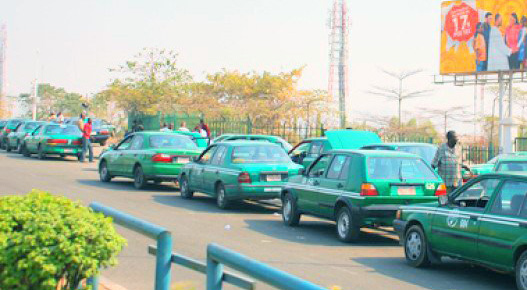3
As dawn breaks in Zuba, a bustling suburb on the outskirts of Abuja, the once-reliable stability of civil service jobs is fading, replaced by a daily struggle for survival. Ibrahim Musa, a mid-level officer at the Ministry of Works and Housing, embodies this shift. His morning commute in his grey Toyota Corolla has transformed into an impromptu taxi service. Rising inflation, soaring living costs, and stagnant wages have turned what was once a secure job into a source of quiet desperation. Civil servants like Musa are now resorting to unofficial side hustles just to make ends meet. In a city that reflects both power and hardship, these workers are redefining their roles, grappling with shame and exhaustion as they navigate an economy that fails to adequately reward their dedication. SOLA SHITTU reports
At 6:15 a.m., the air around Zuba is already thick with activity. Cars crawl along the highway toward the city centre, headlights cutting through the morning haze. Among them is Ibrahim Musa’s grey Toyota Corolla. For Musa, the car is now a lifeline.
Every morning, before clocking in at the Federal Secretariat, he ferries six passengers from Zuba to the Central Area, charging ₦1200 each. He repeats the process in the evening, picking up commuters on his way home. What began as a way to offset rising fuel costs has become a daily survival ritual.
“It’s not something I’m proud of,” Musa says, lowering his voice. “But my salary can’t cover fuel, rent, and feeding my family anymore. If I don’t do this, I’ll be broke before the middle of the month.”
In Abuja, Nigeria’s seat of power and a city once associated with the elite, hardship is reshaping lives. Civil servants, once considered part of the country’s stable middle class, are quietly sinking into financial distress. Many now moonlight as kabukabu drivers, operating unofficial taxi services with their personal cars just to survive in an economy that no longer rewards honest labour.
Inflation in Nigeria has surged beyond 30%, food prices have tripled, and transportation costs have skyrocketed since the removal of fuel subsidies. Yet, the minimum wage remains ₦70,000 – an amount that wouldn’t even buy a single bag of rice at today’s market prices.
For the average civil servant earning between ₦80,000 and ₦150,000 monthly, the math of survival no longer adds up. Rent in satellite towns like Karu, Kubwa, and Lugbe consumes half their pay. Transport to and from work eats up another quarter. What remains must cover food, school fees, and healthcare expenses.
“Government workers are now among the working poor,” says Dr Adewale Adetunji, a labour economist at the University of Abuja. “They go to work daily, but their purchasing power has collapsed. The value of civil service employment as a guarantee of stability is gone.”
Office by Day, ‘Kabukabu’ by Night
After official hours, as government offices empty, the streets of Abuja come alive with a different kind of workforce. Many cars that once symbolised middle-class comfort now serve as vital survival tools.
In Wuse, Garki, and Jabi, it’s become commonplace to see government-registered vehicles picking up passengers at night. Their drivers – civil servants, clerks, and even senior officers – transform into unofficial taxi drivers. Some register on ride-hailing platforms like Bolt or inDriver, while others operate informally, capitalising on the evening rush to earn extra income.
“I do Bolt three times a week after work,” confides Emmanuel, a staff member of the Ministry of Information. “I earn around ₦40,000 on a good night. That’s what I use to buy food. My salary now only covers house rent.” The line between dignity and desperation is rapidly blurring. For many, it’s not about greed, but sheer survival.
The Morning Hustle to the Secretariat
Beyond the night runs, another, less visible hustle has emerged: the morning shuttle. Civil servants are now turning their daily commutes into informal transport services.
Each weekday, the main roads leading into Abuja from Kubwa, Nyanya, Karu, and Lugbe are lined with commuters hailing down cars. Many of these vehicles are driven by civil servants headed to the Federal Secretariat, who pick up passengers along the way.
“If I carry three people to town at ₦700 each, that’s ₦2100,” says Grace, a junior officer at the Ministry of Education. “It helps me buy fuel for the day. Without that, my car will be grounded before the week ends.”
By 8 a.m., the Federal Secretariat car park resembles a marketplace of side hustles. Civil servants arrive with passengers, park their cars, and rush to their offices. The same routine plays out in reverse in the evenings.
A taxi union official at Area 1, speaking anonymously, confirmed that the practice is now widespread: “We know many of the cars you see carrying people to the Secretariat are civil servants. They aren’t ashamed anymore; everyone is just trying to survive.”
Inside WhatsApp groups and Telegram channels, Abuja’s “civil service drivers” exchange tips, share information about passenger locations, and discuss fuel prices. Some have formed small syndicates where they rotate their cars for night driving.
A few even take out loans or hire-purchase agreements to buy Tokunbo (used) cars specifically for full-time driving. Others pool their resources to collectively maintain the vehicles.
“We call it ‘government hustle,’” jokes Kelechi, an officer in one of the ministries in Garki. “During the day, we serve the government; at night, we serve the people.”
It’s gallows humour that masks deep frustration. With no salary increases in sight and the cost of living outpacing income, even those with steady jobs now face chronic financial anxiety.
For many of these workers, the hardest part isn’t the work itself, but the shame of being seen. “My biggest fear is running into a colleague or my boss while driving passengers,” says Musa. “I remove my office ID and wear a baseball cap.”
The toll is both physical and emotional. Some return home past midnight, only to wake up again by 5 a.m. to beat the traffic. Chronic fatigue, stress, and anxiety are now common among mid-level staff.
“I sleep four hours a night, and my blood pressure is rising,” says Grace. “But what can I do? My children must eat.”
Dr Fumilayo Adebisi, a psychologist at the Federal Staff Hospital, warns that the mental health toll of economic hardship on civil servants is worsening. “Many of them suffer in silence. They feel trapped between public expectations and private struggles. The result is burnout, depression, or withdrawal.”
Unions and Authorities Look Away
Nigeria’s labour unions appear overwhelmed. The Nigeria Labour Congress (NLC) and Trade Union Congress (TUC) have held meetings with the Federal Government regarding wage reviews, but negotiations have dragged on for months.
“We know our members are suffering,” admits a senior NLC official who requested anonymity. “Many have resorted to driving taxis or running side businesses. But until the government adjusts wages to reflect inflation, people will keep hustling.”
Government officials often downplay the problem. A director in the Office of the Head of Civil Service told the Saturday Independent that “civil servants engaging in private business after hours is not illegal,” though he conceded that “the scale of it today reflects economic distress.”
Meanwhile, the Federal Government’s temporary palliatives and ₦35,000 wage award have barely made a dent. “The wage award has stopped,” said one Ministry of Labour source. “And even when it was paid, it didn’t last three days for most workers.”
The Nigerian civil service, once the pride of post-independence stability, now mirrors the larger national decline. What used to be an institution of modest prestige has become a reflection of economic erosion.
A senior officer at the Ministry of Finance lamented: “When I joined the service 20 years ago, a car and a decent house were achievable dreams. Today, even an assistant director borrows money to pay school fees. The system has reduced us to survivalists.”
The situation also raises ethical concerns. Some fear that desperation could breed corruption, absenteeism, or conflicts of interest. “When workers lose dignity, integrity becomes negotiable,” warned Dr. Adetunji.
A City of Side Hustles
Abuja, once defined by its orderliness, now thrives on side hustles. Civil servants are involved in real estate, POS businesses, catering, forex trading, and taxi driving – all in a bid to survive.
The once-clear boundary between public and private enterprise has blurred completely. The city’s roundabouts, secretariat corridors, and WhatsApp status updates all tell the same story: everyone is selling something.
“We have reached a point where having a job doesn’t mean you can live decently,” says sociologist Dr. Helen Aina. “People now measure survival in hustles, not salaries.”
Some ministries have quietly warned staff against moonlighting, citing conflicts with public service rules. But enforcement is weak.
“If they sack us, who will replace us?” one driver laughs bitterly. “Everyone knows we’re all suffering—even the directors.”
Indeed, many senior officers tacitly tolerate the practice. In some ministries, staff car parks empty out at lunchtime as workers dash out to deliver short Bolt rides before returning to their desks.
As dusk falls again on the Abuja skyline, cars stream out of the city toward the satellite towns. Many bear civil servants behind the wheel – one hand on the steering wheel, the other on the wheel of survival.
For them, the road is more than a route home; it’s a rolling metaphor for Nigeria’s economic drift. Each passenger picked up, each ₦1000 collected, is one more day bought in the long war against poverty.
“I just pray I don’t lose myself in this hustle,” Musa says quietly as he drops off his last passenger at Zuba Junction. “I’m not lazyyyyyyy. I just want to live.”
In the city built to represent national order and progress, Abuja’s civil servants now drive through the night chasing both—in the faint hope that the next morning, something might change.








